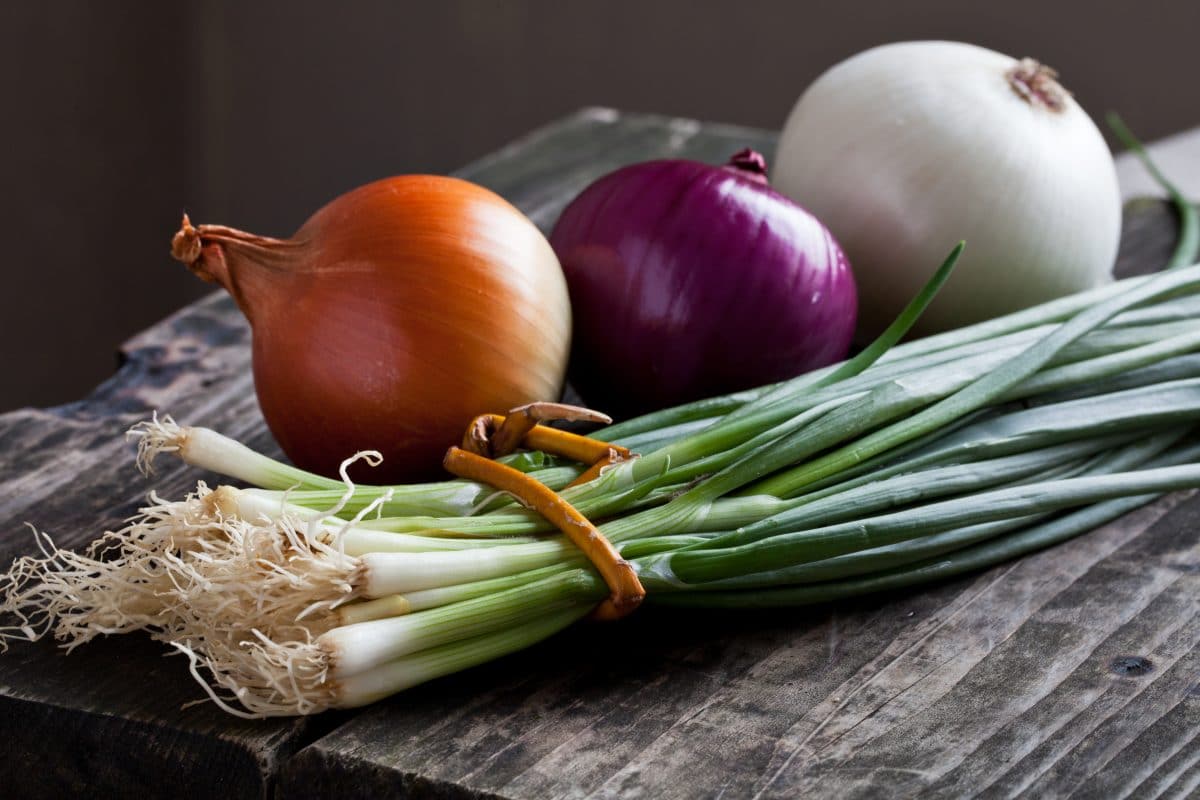Onion intolerance – are onions triggering your IBS?
- Low FODMAP diet
Are you wondering if you could have an onion intolerance?
This article covers why this might be true and the symptoms that onions can cause in IBS. We will also provide you with fantastic substitutes to enjoy the same excellent onion flavour.

Are onions good for you?
Onions can be a valuable part of a healthy, balanced diet. Onions contain various vitamins and minerals and antioxidants. Not to mention that onions are a prebiotic, which can promote the number of good bacteria in our gut.
Do onions cause symptoms such as gas in IBS?
If you feel like you have an onion intolerance, you are not alone. Onion intolerance in IBS is common. One study found that 60% of participants reported onion as the most frequent trigger for their IBS symptoms (3).
The Monash food app rates all types of onions as high FODMAP. These include; red onions, white onions, shallots, spring onions and sauces containing onions too (4). The high FODMAP content is due to onions containing fructans (5).
FODMAPs can draw water into the small bowel and ferment in the large bowel. For people with IBS, this can result in diarrhoea, gas, bloating and pain. Your severity of symptoms caused by the fructans in onions may vary depending on how sensitive you are to fructans.
It’s important to note that intolerance and allergy are very different. An allergy creates an immune response, and symptoms may include dizziness, vomiting or difficulty breathing.
Common foods which contain onion
In some people, even the smallest amount of onion in foods can cause an upset stomach.
If you are very sensitive to onion, be aware that it is commonly found in the following products:
- Salsa
- Premade sauces
- Pre-prepared soups
- Flavouring packets
- Broths; vegetable, chicken, meat or bone
- Some deli meats
How to manage upset stomach from onions
Management of your symptoms will depend on what they are. Relief from symptoms is also very individual.
For example, you may find that a gentle stroll or light activity may help relieve bloating whilst someone else may benefit from loose-fitted clothes.
Read more about bloating relief in this article here.
If you get stomach pain from eating onions, read more about peppermint oil and antispasmodics in their role in pain relief in IBS.
If you suspect a link between onions and your gut symptoms, it would be worth cutting out onions from your diet. Then, slowly reintroduce the food in increasing quantities until your symptoms return. Doing this will help you determine how much onion you can tolerate.
Low FODMAP onion substitutes
Onions are a popular ingredient used in many dishes, from breakfast to dinner. It can be hard to find recipes and dishes without onion.
Cooking whilst on the first stages of a low FODMAP diet requires the removal of onion in the diet; however, this does not mean that flavour needs to be removed.
Below are some onion substitutes in quantities certified by the Monash app as low FODMAP:
- ¼ teaspoon green onion powder
- Onion-infused oil
- The green tops of spring onions
- One teaspoon of chives
- 1 cup of chopped leek leaves (not the white bulb part)
- 2g of Asafoetida powder
- Two pickled onions
Don’t forget about other low FODMAP friendly flavours, including ginger, fresh herbs, spices, lemon and lime juice to add to cooking whilst on a low FODMAP diet (6).
Tips for cooking with onion
Another way of getting the onion flavour for dishes is to use the onion in cooking and remove it before you serve (7).
It is worth knowing that fructans are water-soluble, so consuming any cooking water may result in high fructan consumption.
In oil-based cooking such as stir-frys, you can add onion in chunks to help infuse the flavour without leaching any FODMAPs into the meal. Just remember to remove the onion pieces before serving.
Summary
The bottom line is that onions are not FODMAP friendly due to their fructan content. If you are sensitive to fructans, then this could be why you feel like you have an onion intolerance.
However, you can still enjoy the onion flavour in cooking using the ingredient swaps and tips provided in this article. Article written by Camilla Donaldson BSc Hons Nutrition and reviewed by Beth Willson Specialist Surgical Dietitian BSc Hons